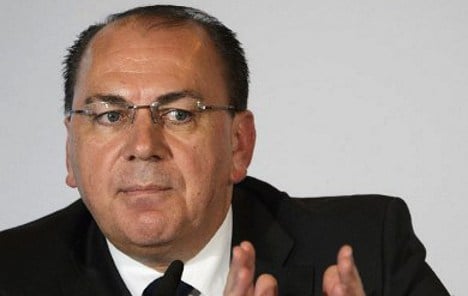Weber told a debate in Bern on Monday that the introduction of negative interest rates in Switzerland in January was forcing changes to the way banks handle wealth management, notably their longer-term investments.
Negative rates are “a challenge for banks' margins” in particular, he told the event organized by the Swiss Bankers' Association.
In January, Switzerland's central bank introduced an interest rate of -0.75 percent on assets held by financial institutions including banks, securities dealers and insurance companies.
The Swiss National Bank (SNB) had announced the drop in December — the first move of its kind in Switzerland in decades — to stop the franc getting any stronger, after the Russian ruble crisis sent investors scurrying to the safe haven currency.
The rate announced in December was -0.25 percent, but the SNB decided to push it even lower on January 15th in a bid to deter investors from taking refuge in the franc and pushing its value sky-high, making imports cheaper but damaging the vital export and tourism industries.
“January 15th had a very strong impact in Switzerland,” Christian Hinze, director of Swiss operations for US asset management giant BlackRock, told Monday's debate.
Some institutional investors have been left with cash to invest as opportunities for investing those funds have been diminishing, he added.
Investors have been turning “more towards alternative investments”, including ones involving higher risks, but also more passive investments such as in financial indexes, Hinze said.
Negative interest rates are another headache for Swiss banks, who are already under pressure to increase transparency in the wake of episodes such as the “Swissleaks” scandal, which saw HSBC pay 40 million Swiss francs ($43 million, 38 million euros) in compensation last week to end a probe into claims its Swiss private banking arm helped clients evade millions of dollars in taxes.
The number of banks in Switzerland has decreased in recent years due to pressure on margins.
Mark Branson, director of Swiss financial authority Finma, told the forum that competition was fiercer than in the past and that banks' margins would probably not return to pre-crisis peaks.
But he stressed that some 300 banks remained active in the Switzerland, even though some foreign banks had chosen to withdraw.
“Fewer banks doesn't necessarily mean that the financial sector will lose ground,” he said.
Despite the concerns raised by Weber, UBS, the country's biggest bank, announced an 88 percent surge in first quarter profits last month despite the strong franc, outstripping analysts' forecasts.
SWISS FRANC
Negative rates a hurdle for banks: UBS chair
Negative interest rates represent a major challenge for Swiss banks, particularly in trying to defend their profit margins, UBS chairman Axel Weber says.
Published: 9 June 2015 08:50 CEST

Axel Weber: concerned by negative interest rates. Photo: AFP
Url copied to clipboard!


 Please whitelist us to continue reading.
Please whitelist us to continue reading.
Member comments